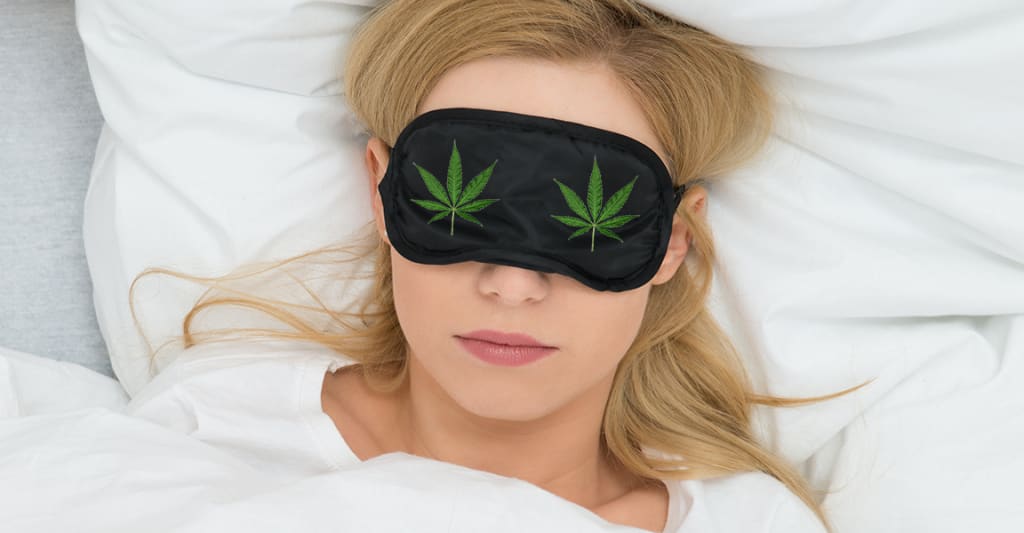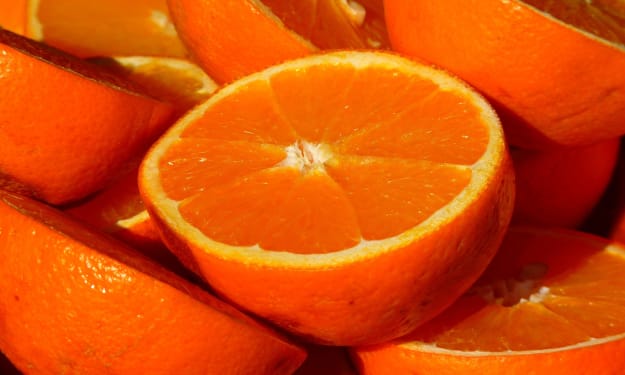How Weed Affects Our Dreams
A majority of tokers out there don't have a clue as to how weed affects our dreams, so let me be the first to tell you: potheads can't dream.

As deeper and more embedded research unlocks the secrets in the marijuana plant itself, insight into how weed consumption affects our dreams have been greatly explored. What most of these studies have come to show, however, is that cannabis may actually reduce the likelihood for one to have a dream, more accurately put: marijuana limits an individual’s REM sleep. Thanks to the 2008 study, we now know that heavy marijuana use does, in fact, disturb one's natural sleep cycle. This is what is necessary for one to even have a dream in the first place: Rapid Eye Movement requires a person to be in a very deep and natural slumber.
So, while some of us may wish that marijuana consumption was more like the devices in Inception, it’s actually the exact opposite. Wait a second, you’re thinking right now, I thought weed induced fatigue and drowsiness; how can it not boost dream states? There’s still much and more we simply do not yet know about dreams, for instance the very reason for their existence remains in complete bewilderment. That’s what makes learning and researching how weed effects our dreams that much more exciting; not just on discovering the wonders inherent in marijuana consumption, but of the listless bounds so acquired only within the act of dreaming.
History of Research
The question of how weed affects our dreams first was raised by Feinberg and others in the 1975 comparative study of sleep patterns experienced by two sets of users: those on tetrahydrocannabinol (THC) and those on placebos.
Cannabis and sleep, the study then reported, have some linking connotations, seen exponentially in the reduction of REM sleep and eye movement for those on actual marijuana. The trouble with Mary Jane, in the contexts of this sleep study on weed dreaming, is that it interferes with REM sleep. Whatever this exactly implied and the deeper affects this may have embodied were either ignored, or simply unknown of at the time.
What's in a dream?

So many have asked this question before, and despite literal eons of research on the topic, there's still even more questions now than there were when it was first asked. So, in theory, what makes up a dream? By current standards, it is one of three ideas:
- The Information Processing Theory: The more readily and widely believed position for dreams and their deeper connotations, involving the "charging battery" theory in that we all dream in order to reset our energy, or more accurately, to precess and organize a previous day's new information.
- The Psychoanalytical Theory: Sigmund Freud, the guy who believed dreams were the gateways to the purest forms of human fear and secret desires, also had an idea for why dreams even occur in the first place; coded expressions. His theory rests more obviously on psychological aspects, as he saw the world of a dream as an individual's manifested thoughts and emotions.
- The Activation-Synthesis Theory: Interestingly thought provoking, this 1977 postulation, suggested by J. Allan Hobson and Robert McCarley, identifies the dream as a sort of interpretation tool. They believed that whenever one dreams they are inspiring new concepts in complete chaos, or understanding random signals by way of REM sleep.
How does any of this have anything to do with smoking weed or how weed affects our dreams? They all take minor, if nothing else educated, jabs at the confines in a dream and with dream activity. What they tell us is that our current standards in the scientific study of dreams and marijuana is extremely limited.
Sleep Cycles
Before we even begin to understand how weed affects our dreams, we must first discuss underlying sleep research, more accurately the five stages of a natural sleep cycle. Thanks to decades of research and analysis with the electroencephalogram, or EEG, these stages were uncovered as different frequencies of a sleeping individual’s brain waves.
The first 3 stages of the sleep cycle are more of the steps and action for opening the door on sleep, called by scientists the beta, alpha, and theta waves. Next, the delta wave or fourth stage in the sleep cycle, deals with deep sleep and reaching that dream plateau: the fifth and final stage of the sleep cycle, what’s often referred to as the gamma wave. These five stages should be repeated about three times every night, or at least whenever you get a fully rested 8 hours of sleep.
REM Sleep
Rapid Eye Movement, simply REM sleep, is when a person experiences paralysis and dreaming. It's not necessarily the fifth stage of the sleep cycle, it's more like it's own entity—a separate sleep in of itself. If one experiences a lack of REM sleep, then they will most often have less vivid dreams, if any at all.
Since this pseudo-stage of sleeping is necessary for one to even enter the ether of dreams, it would make sense then that marijuana ends up canceling them out. This is directly how weed affects our dreams; by suppressing REM sleep and limiting the chances for even reaching that so-called dreamscape. There is, however, another way for potheads to dream...
Catching the Rebound
Dr. Samoon Ahmad is one of the many experts on REM sleep in conjunction with weed consumption. His research into the connotations of cannabis and dreaming have revealed, among other things, that while weed itself my suppress REM sleep and dreams, quitting can then lead to a whole increased renewal in what you've been missing.
This is what people in the industry call the "REM rebound effect," whereupon an individual's marijuana abstinence can then lead to a bout of REM sleep and vivid dreams unlike ever before experienced. Much like, and often even because of withdrawal, the REM rebound serves almost as the body's way in coping with a deprived sleep cycle. A few marijuana consumers even use this element in how weed affects our dreams to their advantage...
Controlling Insomnia & PTSD

While commonly identifying stoners as the architects of medicinal cannabis, in this case it was actually dreams themselves that did that. The REM rebound effect gave us the insight needed in identifying the more positive benefits in reducing dreams. One of the more amazing and obvious therapeutic elements of how weed affects our dreams is in the limitations of nightmares, which is great for victims of PTSD.
Besides that, there's a host of pros for those suffering with sleep disorders, such as insomnia. Since weed alleviates anxiety and administers drowsiness, it can make even the most wakeful of individuals sleep like a teddy bear in hibernation. It can also promote longer sleep cycles, resolve breathing issues, and quicken the onset of sleep itself. These are only but a few medicinal elements in how marijuana can be used to treat sleep disorders and other ailments surrounding dreams.
REM Suppression
Abstaining from smoking weed, as aforementioned, can then lead to an increase in dream activity, often more vivid and sometimes even lucid than non-REM rebound experiences. What this means is that suppressing REM sleep by quitting marijuana consumption, in theory, will generate 6-7 weeks of sleep disturbances after 2 to 3 days of abstinence.
Suppressing REM sleep may have some beneficial factors, like subverting certain sleep disorders and unearthing deeper concepts within sleep cycles, but it actually isn't all that great for you, and marijuana isn't the only way you can induce it. Even people suffering from sleep deprivation can and will experience a rebound effect in non-REM sleep, and this goes for those taking sleep medications and regularly using alcohol, too.
REM Necessity
Dr. Hans Hamburger, though, stresses the necessity for REM sleep by ignoring how weed affects our dreams and positing the realities inherent in the nature of sleep:
"By smoking weed, you suppress the REM sleep, and with that you also suppress a lot of important functions of that REM sleep. One of those functions is reliving the things you have experienced and coming to terms with them, as it were. Processing all kinds of psychological influences is something you do in REM sleep. You also anticipate the things that will happen the next day or days after that. While you're sleeping you already consider those and make decisions in advance."
This is mind-blowing information, if at all true. Yes, Hamburger is a reliable source and one of the most talented experts on Somnology, or the study of sleep, but there stands a remarkable friction between that of what we do and don't know under the current contexts of sleeping and marijuana consumption.
Limited Data
Bear in mind that how weed affects our dreams still is being studied to this day and may never quite be answered in its entirety. While many various people have looked into or examined the connections between cannabis and sleep, nothing new in the form of a sleep study has as of yet been proposed. As Dr. Timothy Roehrs says on the current ideologies in how weed affects our dreams:
"The literature on whether or not marijuana affects REM sleep is extremely weak and equivocal. Some studies have shown it suppresses REM sleep, some studies have shown it doesn't."
As you can see, much about what we know even with dreams alone remains a mystery. The realities behind how marijuana consumption affects our sleep cycles is still very much an ongoing procedure and requires intellectual insight in line with...
Deeper Research

Using cannabis for pain management is great and all, but what if we could do so much more with it? What if medical marijuana could be used in a way to not only benefit how we sleep, but may possibly even go deeper in the improvement of our very dreams. Today, though, we can barely even identify why or how dreams even work, let alone what weed consumption may or may not bring to the table.
As in practically all things, a far deeper examination into how weed affects our dreams is needed before anything concrete is accepted or set into motion. There may be some benefits for those suffering with sleep disorders, or it may help others with insomnia, but as of right now we know that cannabis can interfere with our REM sleep, and though it may bring a berth of amazement upon rebounding, the reticence of a natural sleep cycle is necessary for productive, healthy lifestyles.
About the Creator
Gerald Oppugne
I have no idea why I'm here, but let's make the best of it shall we? I like to drink and smoke, so I'll keep you up to date on those worlds if you like em as much as me.





Comments
There are no comments for this story
Be the first to respond and start the conversation.